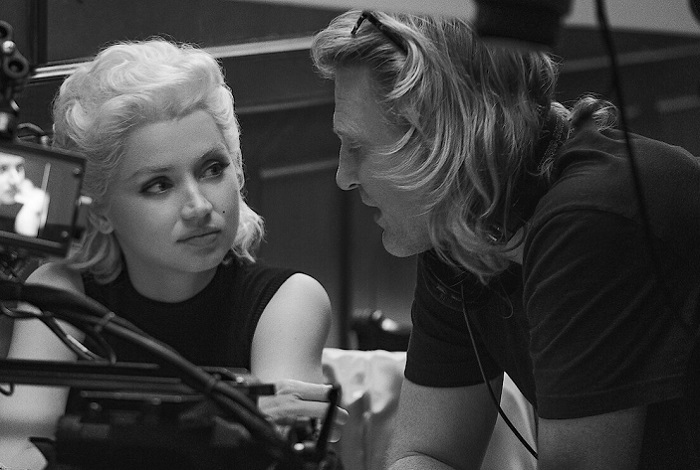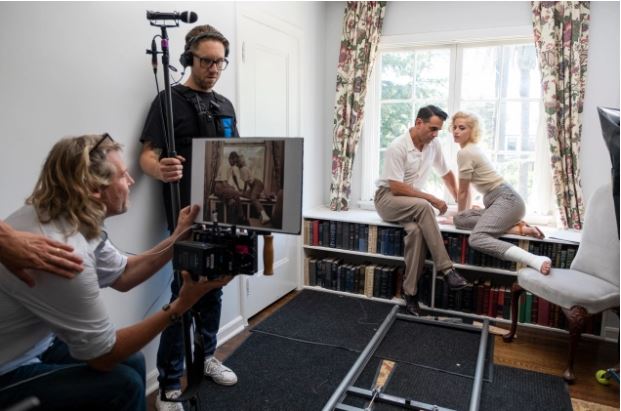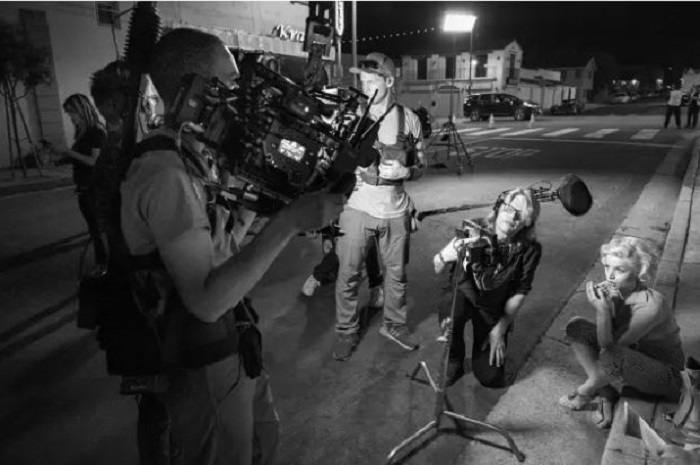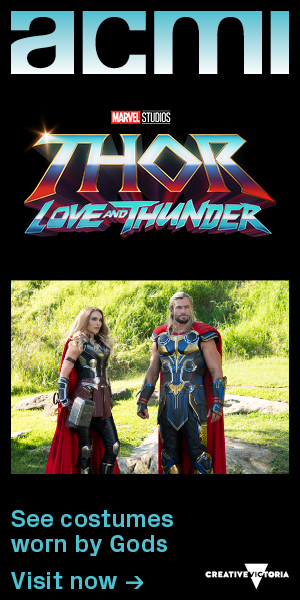By Erin Free
In its usual tired effort to whip up “controversy” and create a story where there perhaps isn’t one, the media – online, television and print, you’re all guilty – has taken to social media in order to stir up a little angst around the new film Blonde, Australian director Andrew Dominik’s adaptation of Joyce Carol Oates’ same-named novel, a fictionalised take on the life of movie star Marilyn Monroe nee Norma Jean Baker.
The fact that Blonde is a Netflix release makes the creation of such brain-dead stories even easier, as those splashing their opinions on Twitter, etc haven’t actually had to pay to watch Blonde, or even actively seek it out, but have likely just tuned in out of curiosity after watching Sex/Life, Is It Cake? or Floor Is Lava.
Basically, is social media where you really need to be when looking for thoughtful discourse on what is essentially a three-hour art movie? Sure, @sueveneer and @C_Simpson are just as entitled to their opinions as anyone else, but should journalists really be quoting them in news stories? Are they really good, reputable sources? Is it any different to a journalistic news story kicking off with the sentence, “I chatted to Bill at the pub, and he reckons Blonde is shit…so does Sharon…everyone hates it”? The sooner hack journalists stop using Twitter as a “source” (they did it with Netflix’s series Dahmer as well), the better off we’ll all be.

So, while the argument against legitimate news agencies and professional journalists lamely and lazily turning to Twitter as a source is one thing (as is the very phrase “according to Twitter”, which absurdly denotes that the social media platform functions as one homogenous thought bubble), the heated response to Blonde has been fascinating.
Yes, this brave and uncompromising film might ostensibly be a Hollywood biopic, but Andrew Dominik’s Blonde is certainly not Elvis, or Judy, or Spencer, or House Of Gucci, or pretty much any other biopic ever made. A cruel, unforgiving, and ultimately deeply, deeply sad masterwork that wades fearlessly into the darkest corners of the human soul, Blonde has more in common with David Lynch’s lacerating Twin Peaks: Fire Walk With Me (another profoundly misunderstood, misrepresented and highly personal work) than it does any other movie about a Hollywood star.
And as those expecting a mere continuation of David Lynch’s beloved TV series were likely shocked and disappointed by Twin Peaks: Fire Walk With Me, so those hoping for another A-to-B biopic on Marilyn Monroe were probably confronted and offended by Dominik’s singularly dark vision. In short, however, they should have seen it coming. With his previous work (Chopper, The Assassination Of Jesse James By The Coward Robert Ford, Killing Them Softly, the Nick Cave doco One More Time With Feeling, his eps of the TV series Mindhunter), Andrew Dominik has fiercely proven himself a director who refuses to compromise or adjust his personal vision for commercial purposes. He is an artist with a capital A, and his interests clearly lie in dark, meaningful, difficult subject matter. The same goes for the iconoclastic American author Joyce Carol Oates, on whose epic, often hallucinatory novel Dominik’s film is based. No standard bio, Oates’ Blonde is a mighty parable about America itself: its worship of celebrity, its cheap elevation of fame, and its cruel tendency to destroy its icons, particularly the female ones. Oates saw Blonde as her own Moby Dick…hardly easily digestible pop entertainment.

Blonde has also been called out by several thoughtful, intelligent and non-inflammatory commentators (such as The Guardian’s Martha Gill) as a misogynist film. This would seem to suggest that Andrew Dominik in some way enjoys or delights in the pain and suffering that Marilyn Monroe experiences in his film. While the director certainly chooses to focus on the horrors of Monroe’s life (again, it’s no surprise that Dominik would go dark considering his track record) rather than the highs, there’s no detectable authorial hatred for the film’s central character. There’s a beauty and innocence about Monroe in the film that is constantly maltreated and exploited, but there’s no joy in that for the viewer. We feel Monroe’s anguish when she is abused, as opposed to being complicit in it. The scene in which Monroe is brutally and horribly raped by a Hollywood studio head is the antithesis of titillating, while her long mythologised dalliance with glamour boy US President John F. Kennedy is similarly stomach-churning. The aim of Blonde certainly does not appear to be to get anyone off.
Throughout the film, Dominik’s affection for his subject is obvious. The director pointedly shows that Monroe was an intelligent, passionate, well-read woman constantly underestimated by the powerful men around her, whether it’s the casting directors too stupid to recognise her talent, or her own scornful, arrogant playwright husband Arthur Miller, perfectly played by Adrien Brody. Like many women of her era, Monroe was viewed and valued by most of the powerful men in her world as nothing more than a sexual commodity. The fact that that is so sad and difficult to watch throughout Blonde would appear to work against the claims of overt misogyny levelled against it. As played so effectively by Ana De Armas, the audience cries for Marilyn Monroe, and does not derive joy from her suffering.

By many, many accounts, Monroe’s life was a sad, traumatic, and tragic one. Should that story not be told? Should we only tell happy, positive, uplifting stories about famous women? There’s certainly a fair amount of pain and suffering in the biopics about famous male figures too. Does Blonde not shine a light on the same kind of gender abuses that were dragged out of the darkness when Harvey Weinstein and Jeffrey Epstein were finally brought to justice? Blonde is a topical, highly contemporary film despite its period milieu. “I haven’t seen these attacks,” Joyce Carol Oates has written in response to the charges of misogyny levelled at Dominik, “but it is unfortunate since Andrew Dominik’s screenplay (which I’d seen years ago) had struck me as remarkably ‘feminist’ in intention. Here was a male perspective near-identical with the primary aims of #MeToo: telling women’s stories long censored.”
Blonde has also been widely and vociferously attacked as an “anti-abortion” film because of its scenes in which Monroe is forced to go through a horrendous abortion, and also by sequences in which she is spoken to by her CGI-rendered unborn child. “It is a shame that the creators of Blonde chose to contribute to anti-abortion propaganda and stigmatize people’s health care decisions,” the advocacy group Planned Parenthood said in response to the film. Monroe’s abortion is delineated as another form of abuse, and is presented in a nightmarish, hallucinogenic sequence so bizarre that it’s difficult to imagine anyone could possibly view it as a form of propaganda, or as an approximation of an actual abortion. Yes, Monroe’s abortion is presented as a difficult decision that permanently scars her (as it perhaps is for most women), but that hardly qualifies Blonde as a piece of “anti-abortion propaganda”. It is certainly one of the more surprising accusations levelled against the film, and Dominik has placed these criticisms within the recent controversies surrounding the rolling back of Roe Vs Wade in the US. “This is about Norma’s feelings about it, and Norma’s feelings about it are valid,” Dominik has said. “She’s not existing in 2022. It’s not about 2022. It’s about the ’50s.”

In the end, the issues around Blonde – like those with most matters cinematic – are those of personal taste. Should films only be made about strong, successful women? Should the darkness in a real life figure’s existence be glossed over, or explored? Is the sole purpose of a movie to entertain? If a director shows a woman being exploited on screen, does that mean he’s exploiting her too? Blonde is a big, manic, and very strange movie, but one that has a rich, deep sense of love for its central character. In Andrew Dominik’s Hollywood nightmare, Marilyn Monroe is a shining light constantly threatened by the male-driven forces of darkness around her. She is abused by all the men in her life, and Blonde makes us sympathise even more strongly with Marilyn Monroe because of it. Though it’s a difficult, frequently unpleasant, and often uncomfortable work, Blonde is not a misogynist one, nor is it a piece of propaganda of any kind. It’s an art movie…and art movies are not for everyone…especially ones directed by Andrew Dominik.
Blonde is streaming on Netflix now.





